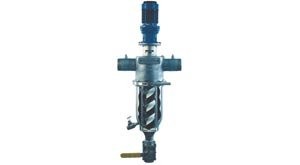From waste oil to high-grade fuel oil
Quebec waste management firm uses innovative filter technology to break into a new market

by Del Williams,
Global Recuperation is an innovative waste management and recycling company out of Saint-Pierre-Baptiste, Quebec. The company has created a high-grade fuel oil made from waste oil. They’ve done this by using a self-cleaning filter that reduces labour by 75 percent, maintenance by 50 percent, and allows the process to be done using 60 percent less production space.
According to a recently released EPA document titled, “Collecting Used Oil for Recycling/Reuse,” in the United States alone an estimated 200 million gallons of used motor oil are improperly disposed of by being dumped on the ground, tossed in the trash (which ends up in landfills), and poured down storm sewers and drains.
The EPA document goes on to say that, “If all of the used oil that is improperly disposed of were properly managed, the United States could save thousands of barrels of oil each day.” And further that, “Used oil that is properly handled can be re-refined into lubricants, processed into fuel oils, and used as raw materials for the refining and petrochemical industries.”
Through waste oil recovery and reuse programs, pro-active nations such as the U.S. and Canada, as well as many municipalities are looking to turn the hazard of improper waste oil disposal into a valuable resource. In this effort, savvy companies are taking advantage of a new generation of self-cleaning filter technology that can process waste oil into quality products more effectively, with less downtime and labour impossible with traditional equipment.
Capturing a new market
Global Recuperation reclaims used motor oil and filters, along with other industrial commodities. Though waste oil is mandated for reuse in much of Canada, Eric Poisson, the company’s president, wanted to capture an underserved market niche for a higher grade of fuel oil, made from processed waste oil.
“A number of industrial clients required a simpler, cleaner burning fuel oil than the market offered from filtered waste oil,” says Poisson. “Before burning, typical filtered waste oil has to be pre-screened by the user in several steps, and it leaves more residue than desired.”
Traditionally, Global Recuperation and other processors in Quebec filtered waste oil with static filter cartridges at 20-mesh (900 micron). But there were production challenges with this approach.
“The waste oil contained a variable percentage of solids that rapidly clogged our static filters,” says Poisson. “A dedicated operator had to manually clean the filters every 10 to 60 minutes, depending on the concentration of solids. Each time, he had to remove the filter cartridge, clean and replace it, then restart production. It was too slow, labour intensive and costly.”
To produce a cleaner, higher-grade fuel oil from waste oil and to streamline production, Global Recuperation turned to a state-of-the-art, self-cleaning filtration system from Russell Finex, out of Pineville, North Carolina.
“With the self-cleaning filter screening at 150-microns, our process removes more foreign particulate from waste oil, including tiny ice crystals that can form in winter, resulting in a cleaner burning fuel oil with less residue,” says Poisson. “Because there are fewer particulates, our high-grade fuel product only needs to be pre-screened once before use, unlike inferior fuel oil which needs to be pre-screened several times. Fuel pumps last longer too, due to the better filtration.”
“My customers pay for fuel oil, not impurities or water, and that’s what they get,” adds Poisson.
Plus, since the Self-Cleaning Russell Eco Filter system integrates directly into the pipeline used in the process, it eliminates labour-intensive manual cleaning tasks such as changing filter bags or cleaning filtration baskets. The filter element is kept continuously clean via a unique spiral wiper design, ensuring optimum filtration efficiency. And due to its design, cleaning the filter between batch runs is quick and easy, with minimal disruption during production changeovers. Additionally, a unique Q-Tap valve allows the sampling of freshly filtered material so quality can be easily monitored on the fly without interrupting production.
According to Global Recuperation, compared to previous manually-cleaned filters, the new Russell Finex filter system is saving the company a substantial amount of labour and downtime.
“The automatic wiper removes all solids that stick to the filter so it’s always clean,” says Poisson. “An operator just keeps an eye on the system and spends his time on other shop tasks. Eliminating the downtime of cartridge cleaning and replacement has dramatically improved production workflow. We’ve reduced labour by 75 percent and cut maintenance by 50 percent.”
As companies like Global Recuperation are discovering, the Self-Cleaning Russell Eco Filter fits neatly into existing production lines, in many instances adding significant capacity without requiring excessive space.
“The self-cleaning filter takes up 60 percent less space than our old static filters,” says Poisson. “This has freed up production space that will help us expand within our existing facilities as business grows.”
Additionally, because the self-cleaning filter is totally enclosed, it prevents outside pollutants from contaminating product and protects operators from any spillage or fumes. According to its manufacturer, users will see substantial improvement in product purity, throughput and waste elimination. And a choice of easily swapped filter elements can give additional flexibility to meet the quality demands of customers.
“Since my operators don’t need to remove filter cartridges, they don’t expose themselves to vapours or waste oil contaminants,” says Poisson. “My operators are happier, and there’s no smell of waste oil in the shop.”
Poisson sums up the benefit of switching to the self-cleaning filter: a safer environment for his operators and business, as well as for society.
“With higher margins on a higher-quality fuel oil product, along with significantly lower labour costs,” he says, “we’ll achieve ROI on the Eco Filter within a year.”
Company info
1071, Rue Principale,
Saint-Pierre-Baptiste, QC
CA, G0P 1K0
Website:
globalrecuperation.com

